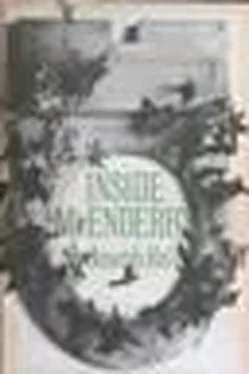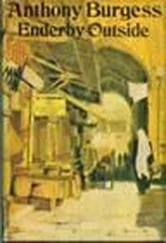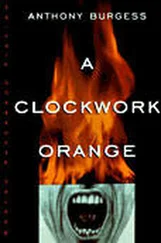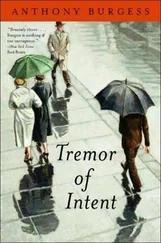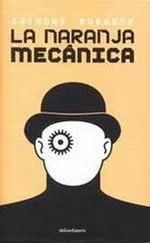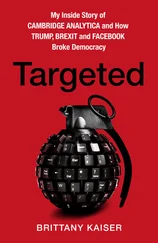The pentecostal sperm came hissing down…
That was not it, the rhythm was wrong, it was not couplets. The couplets came from the doves in the Queen's speech in Hamlet. Doves, loves, leaves. Enderby clomped down the steps and up the steps to the up-train platform. The train was just arriving. There was an -eave rhyme somewhere. Enderby boarded the train. There were few passengers at this hour-women going up to fight in the January sales, a scholarly-looking police-inspector with a briefcase, two men looking much, Enderby thought distractedly, like himself-smart, normal, citified. Doves came from dove, dove meant paraclete. A dove in the leaves of life. Eve, leave, thieve, achieve, conceive.
"I beg your pardon?" said a woman sitting diagonally opposite to Enderby. They were the only two in the compartment. She was thin, blonde, washed-out, fortyish, smart with a mink cape-stole and a hat like a nest. "Peeve," said Enderby the city-man. "Believe. Weave." The train began to pant north-east with urgent love of London, a sperm to be swallowed by that giant womb. "Swallowed," announced Enderby, with loud excitement, "by the giant stomach of Eve. I knew Eve came somewhere into it." The woman picked up her folio-sized handbag and silver-grey couplet of gloves and left the compartment. "Eve leaves," said Enderby. Where was paper? None. He had not expected this to be a working day. Inkpencil he had. He rose and followed the woman out to the corridor. She scampered, with a kitten-scream, to the next compartment, which held a trio of talking and nodding wives drably dressed for sales-battle. Enderby, a homing dove, went straight to the lavatory.
In this spinning room, reduced to a common noun,
Swallowed by the giant stomach of Eve,
The pentecostal sperm came hissing down.
Enderby sat, fully dressed, on the seat of the W.C., swaying as on a father's rocking knee, a cock-horse to Charing Cross. No, London Bridge. No, Victoria. An electric sperm plunging towards Our Lady of Victories, Enderby astride. He had removed the toilet-roll from its holder and scratched away on panel after panel of paper with his ink-pencil. The poem was definitely a song for the Blessed Virgin.
Whence this Marianism? Enderby knew. He remembered his bedroom with its devotional pictures by Italian commercial artists: Pius XI with triple tiara and benedictory gesture; Jesus Christ with radioactive heart exposed and-for good measure-indicated by a divine delicate index-finger; saints (Anthony, John the Baptist, Bernadette); the Virgin Mary with tender smile and winsome wimple:
I was nowhere, for I was anyone -
The grace and music easy to receive:
The patient engine of a stranger son.
Outside the bedroom door had been a holy-water stoup, dried up with the drought of Enderby's boyish disbelief. All over the house, as far as the frontier of the shop's neutral or Protestant territory, there had been other stoups, also crucifixes, plaster statuettes, withered Holy-Land palm-leaves, rosaries blessed in Rome, an Agnus Dei or two, decorative pious ejaculations (done in Dublin in pseudo-Celtic script) as brief as snarls. That was his stepmother's Catholicism, imported from Liverpool-relics and emblems and hagiographs used as lightning-conductors; her religion a mere fear of thunder.
The Catholicism of the Enderbys had come from a small Catholic pocket not far from Shrewsbury, a village which the Reformation had robbed only of its church. Weak in the tobacconist-father (his pan scraped on Holy Saturday, a drunken midnight Mass at Christmas-no more), it had died in the poet-son, thanks to that stepmother. It had been too late now for more than twenty years to look at it afresh-its intellectual dignity, its cold coherent theology. He had struggled out of it with bitter tears in adolescence, helped by Nietzsche, Tolstoy, and Rousseau, and the struggle to create his own myths had made him a poet. He couldn't go back to it now, even if he wanted to. If he did, he would be seeking the converts who wrote thrillers out of a sense of damnation or who, forming an exclusive club out of the converts of Oxford and pretending that that was the Church, would not let Enderby join. Publicly known as an apostate, Enderby would have to be bracketed along with various wild Irish. It was best, therefore, to be quiet about his faith or loss of it (asked for his religion when joining the army, he had said "Hedonist" and been made to attend parades of the United Board); the only trouble seemed to be that his art refused to be quiet.
His laughter was fermenting in the cell,
The fish, the worm were chuckling to achieve
The rose of the disguise he wears so well.
Ultimately religious belief didn't matter; it was a question of what myths still carried enough emotional weight to be used. So the Virgin Mary now spoke her final triplet, smiling faintly in elegant blue at the distaff:
And though, by dispensation of the dove,
My flesh is pardoned of its flesh, they leave
The rankling of a wrong and useless love.
There was too much love in the air, worried Enderby, as he read over this poem with displeasure. He saw that, apart from the obvious surface myth, there was something there about the genesis of the poet. He wrote on a final panel of toilet-paper: Every woman is a stepmother, then committed it to the lavatory-pan. That, he thought, has general validity. And now, judging from the loud darkness outside the cell where his poem had been an hour fermenting, they had arrived. Roars of seals in a circus, collapse of crates, high heels on the platform, a hiss, shudder and recoil as the train, in Elizabethan locution, died.
Some hours later Enderby sat under a magnificent ceiling, bemused by food and drink and insincere laudations. A not very choice cigar shook between fingers which, he now saw, he had neglected to pumice. In a winter afternoon's dream he failed to register many of the words of orating Sir George Goodby. Across the table and at either side twenty-odd fellow-writers were suspended from the ceiling by cigarette-smoke, their faces flapping before Enderby's eyes like two lines of drying smalls. Very solid in his stomach there pawed and pranced a sort of equestrian statue that symbolized both Time and London. He desired to pick his nose. A Hangman's Blood cocktail of all the liquids he had so far taken that day was swiftly mixed in a deep visceral shaker and then shot up to his mouth for tasting. There had been an oily mock turtle with very fresh rolls and rose-shaped butter-pats. Roast duck, of which Enderby had been served with one of the greasier segments, peas and sauté potatoes, acid orange sauce and a thick warmish gravy. Cranberry pie, the pastry soggy, with rich whipped cream-substitute. Cheese.
Cheese. Enderby smiled across back at some woman who had smiled at him. I have always admired your poetry but to see you in the flesh is a revelation. I bet it bloody well is. Perrrrrp.
"A revelation," said Sir George, "of the purest beauty. The magical power of poetry to transmute the dross of the everyday workaday world into the sheerest gold." Sir George Goodby was an ancient man whose visible parts were made mostly of sewn bits of well-tanned skin. He had founded the firm which bore his name. This firm had become rich mainly by selling rude books which other firms had been too squeamish to handle. Knighted by Ramsay MacDonald for services to the cause of mass-literacy, Sir George had always desired to serve literature otherwise than by selling it: he had aspired from youth to be a starving poet recognized only after death. Starved poetry he had continued to write long after fate had condemned him to the making of money, and this he had blackmailed one small miserable firm into publishing, brandishing the threat of a chain-boycott of all its publications. He had paid all costs of printing, publicizing, and distributing, but the firm's reputation had been ruined. The volumes of Sir George's doggerel most memorable for badness were Metrical Yarns of a Pipeman, A Dream of Merrie England, Roseleaves of Memory and An Optimist Sings. He could not, of course, force people into buying or even reading these atrocious collections, but once a year, presenting a cheque and medal to, as he coyly termed him, a brother-singer, he would lard his speech richly with gobbets of his own work and render his auditors sick with embarrassment.
Читать дальше
